
Jim Thorpe is a borough and the county seat of Carbon County in the U.S. state of Pennsylvania. It is part of Northeastern Pennsylvania. It is historically known as the burial site of Native American sports legend Jim Thorpe.
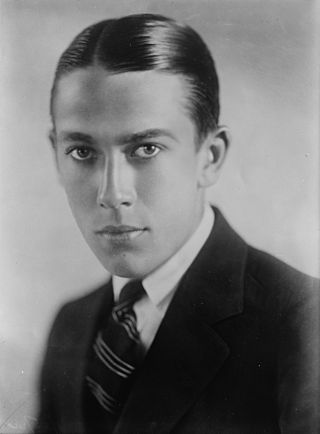
John Charles Smith, known professionally as Jack Pickford, was a Canadian-American actor, film director and producer. He was the younger brother of actresses Mary and Lottie Pickford.
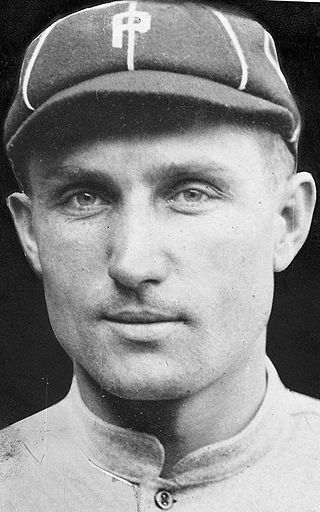
David James Bancroft was an American professional baseball shortstop and manager. He played in Major League Baseball (MLB) for the Philadelphia Phillies, New York Giants, Boston Braves and the Brooklyn Robins between 1915 and 1930.
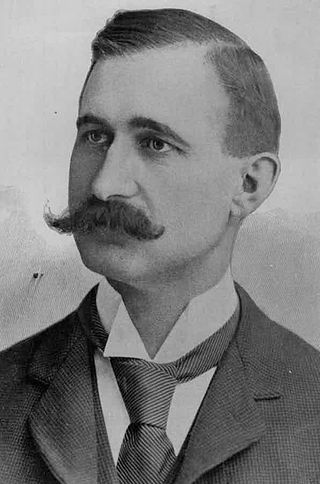
Samuel Luther "Big Sam" Thompson was an American professional baseball player from 1884 to 1898 and with a brief comeback in 1906. At 6 feet 2 inches (1.88 m), the Indiana native was one of the larger players of his day and was known for his prominent handlebar mustache. He played as a right fielder in Major League Baseball for the Detroit Wolverines (1885–1888), Philadelphia Phillies (1889–1898) and Detroit Tigers (1906). He was inducted into the Baseball Hall of Fame in 1974.
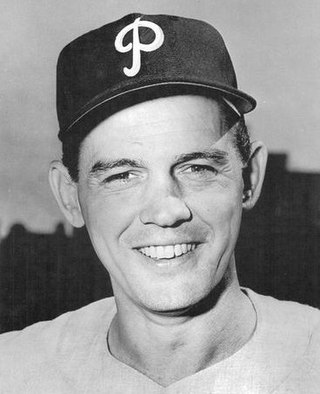
Gene William Mauch was an American professional baseball player and manager who played in Major League Baseball (MLB) as a second baseman for the Brooklyn Dodgers, Pittsburgh Pirates (1947), Chicago Cubs (1948–1949), Boston Braves (1950–1951), St. Louis Cardinals (1952) and Boston Red Sox (1956–1957).
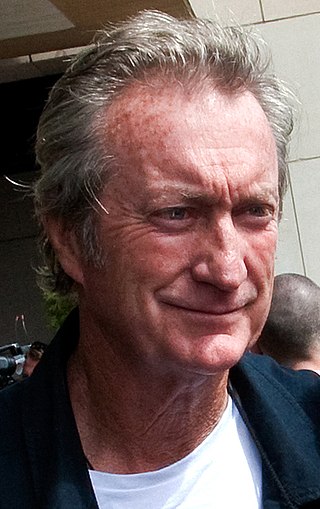
Bryan Neathway Brown AM is an Australian actor and author. He has performed in over eighty film and television projects since the late 1970s, both in his native Australia and abroad. Notable films include Breaker Morant (1980), Give My Regards to Broad Street (1984), F/X (1986), Tai-Pan (1986), Cocktail (1988), Gorillas in the Mist (1988), F/X2 (1991), Along Came Polly (2004), Australia (2008), Kill Me Three Times (2014) and Gods of Egypt (2016). He was nominated for a Golden Globe Award and an Emmy Award for his performance in the television miniseries The Thorn Birds (1983).

The 1921 World Series was the championship series in Major League Baseball for the 1921 season. The 18th edition of the World Series, it matched the National League champion New York Giants and the American League champion New York Yankees.

The Walter Kerr Theatre, previously the Ritz Theatre, is a Broadway theater at 219 West 48th Street in the Theater District of Midtown Manhattan in New York City. The theater was designed by Herbert J. Krapp and was constructed for the Shubert brothers in 1921. The venue, renamed in 1990 after theatrical critic Walter Kerr, has 975 seats across three levels and is operated by Jujamcyn Theaters. The facade is plainly designed and is made of patterned brick. The auditorium contains Adam-style detailing, two balconies, and murals.

Charles Meredith was an American stage, film, and television actor, who also directed plays and taught in college drama departments. His screen career came in two widely separated phases: as a leading man for silent films in the early 1920s, and as a character actor for films and television from 1947 through 1964. He was a series regular on television shows Rocky Jones, Space Ranger and The Court of Last Resort.
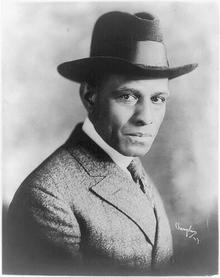
Charles Sidney Gilpin was one of the most highly regarded stage actors of the 1920s. He played in critical debuts in New York City: the 1919 premier of John Drinkwater's Abraham Lincoln and the lead role of Brutus Jones in the 1920 premiere of Eugene O'Neill's The Emperor Jones, also touring with the play. In 1920, he was the first black American to receive The Drama League's annual award as one of the 10 people who had done the most that year for American theatre.
Harvey Max "Hob" Hiller was an American Major League Baseball utility player for the Boston Red Sox in 1920 and 1921. Listed at 5 ft 8 in (1.73 m), 162 lb., Hiller batted and threw right-handed. Although he hit only .167 in the major leagues, Hiller batted .300 or above in several minor league seasons. The Boston Herald described him as a talented but raw fielder.
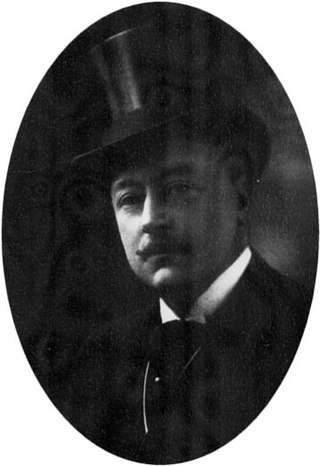
Edward Laurillard was a cinema and theatre producer in London and New York City during the first third of the 20th century. He is best remembered for promoting the cinema early in the 20th century and for Edwardian musical comedies produced in partnership with George Grossmith, Jr., including Tonight's the Night (1914), Theodore & Co (1916) and Yes, Uncle! (1917).
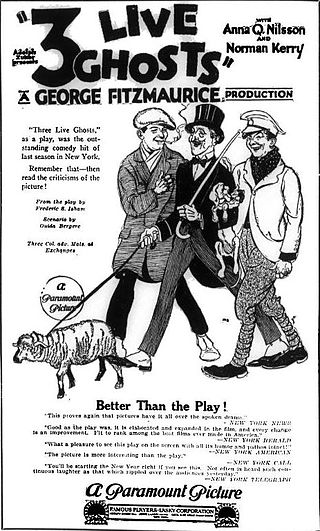
Three Live Ghosts is a 1922 British comedy film directed by George Fitzmaurice. Alfred Hitchcock is credited as a title designer. The film is based on a 1920 Broadway play, Three Live Ghosts, by Frederic S. Isham and Max Marcin. Actor Cyril Chadwick is the only performer from the play to appear in the film. A copy of the film, thought to be lost, was found in a Russian archive and shown publicly in 2015. This version had however been radically re-edited by Soviet censors in the 1920s, making the film a searing critique of post-war Britain, including its relations with Ireland, which achieved Dominion status in the year the film was first shown.
Evon Daniel "Denny" Williams was a professional baseball player whose career spanned eight seasons, three of which were spent in Major League Baseball (MLB) with the Cincinnati Reds (1921) and Boston Red Sox. Over his MLB career, Williams batted .259 with 46 runs scored, 85 hits, four doubles, three triples, and 18 runs batted in (RBIs) in 120 games played.
Murray Kinnell was a British-born American actor, recognized for playing smooth, gentlemanly, although rather shady characters. He began acting on the English stage in 1907, toured in the United States from 1912 through 1914, then returned to England where he served in the British Army during World War I. After the war, he emigrated to the US. He appeared in 71 films between the pre-code era of 1930 and 1937. He later served the Screen Actors Guild in several positions for 16 years.
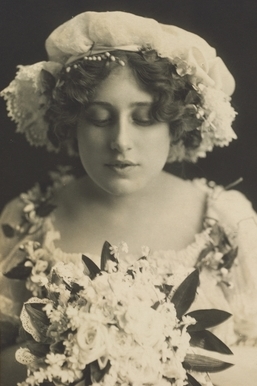
Christine Dorothy Brunton, popularly known as Dorothy Brunton, was an Australian singer and actress prominent in musical comedy in Australia and England from the early-1910s to the mid-1930s. She was born into a theatrical family, her mother had been an actress and her father worked as a stage scene designer and painter. Her early roles were in melodramas for the Bland Holt touring company, for which her father worked. From October 1910 Brunton was engaged by J. C. Williamson's New Comic Opera Company, performing in musical comedy roles and acting as understudy to more established actresses.
Emjo Basshe was a Lithuanian-born Jewish American playwright of Spanish ancestry and theatre director who co-founded New York City's New Playwrights Theatre in 1926. A recipient of 1931 Guggenheim Fellowship for creative work in theatre and drama, and one of the initial members, in 1935, of the Communist Party-founded League of American Writers, he won first prize for Thunderbolt, also referenced as Thunder-Clock, which was judged in a University of Chicago competition to be the "best unproduced long play of the year 1935".

The Anco Cinema was a former Broadway theatre turned cinema at 254 West 42nd Street, between 7th and 8th Avenues in Manhattan, New York City. It opened in 1904 and was originally named the Lew Fields Theatre. It continued to operate as a playhouse under various names until it was converted into a movie theatre in 1930. Its block was famous for its concentration of Broadway theatres turned cinemas. After World War II, the street declined and the Anco Cinema eventually became a pornography venue. It closed as a cinema in 1988 and was gutted for retail use. The building was demolished in 1997.
The Mauch Chunk Opera House, formerly known as the Capitol Theater, is a theatre in Jim Thorpe, Pennsylvania in the United States.

The Jim Thorpe station, also known as the Mauch Chunk station or East Mauch Chunk station, was a Lehigh Valley Railroad station that was located in Jim Thorpe, Pennsylvania.















